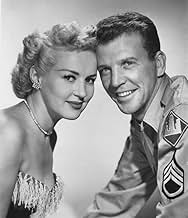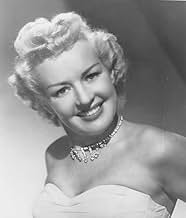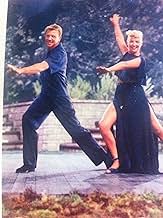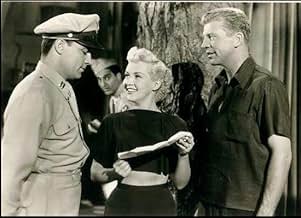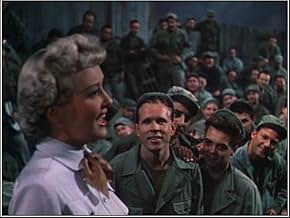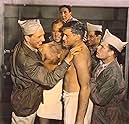CALIFICACIÓN DE IMDb
5.7/10
302
TU CALIFICACIÓN
Un soldado estadounidense en el Japón ocupado intenta reconquistar a su antiguo amor, quien está presentando un espectáculo para las tropas.Un soldado estadounidense en el Japón ocupado intenta reconquistar a su antiguo amor, quien está presentando un espectáculo para las tropas.Un soldado estadounidense en el Japón ocupado intenta reconquistar a su antiguo amor, quien está presentando un espectáculo para las tropas.
- Dirección
- Guionistas
- Elenco
- Premios
- 2 premios ganados en total
The Three Dunhills
- Speciality Act
- (as The Dunhills)
Yumin Akita
- Japanese Man
- (sin créditos)
Richard Allan
- Stewart
- (sin créditos)
Leon Alton
- Soldier
- (sin créditos)
Gordon Armitage
- Soldier
- (sin créditos)
Robert Bohannon
- Soldier
- (sin créditos)
Tommy Bond
- Little Soldier
- (sin créditos)
Opiniones destacadas
So goes the first line of the title song of the 1946 hit Broadway revue on which this is (very loosely) based. 20th obviously couldn't film a revue, and a lot had happened in five years, so it whipped up a story and added some new songs to the Harold Rome score, most of which it discarded. As an adaptation it's a bust, but as an original movie musical it's pretty good. And what really makes it work, of all things, is Dan Dailey. As Betty Grable's still-in-love-with-her ex, he's much more of an actor than most hoofers, and his.yearning and longing provide an emotional center.it surely wouldn't have otherwise. Grable does her usual thing, nicely, with lots of legs, and Danny Thomas is saddled with some shabby material and a not-good song as The Ethnic Humor. The most thrilling, and unexpected, moment is surely "Going Home Train," a celebration of returning GIs led by, of all people, Bobby Short. The plot, such as it is, wraps up quickly and illogically, and Lloyd Bacon's best directorial days were long gone. But as a run-of-the-mill Fox musical with more emotional engagement than most, thanks to Dailey, I like it fine.
Screen-version of the Broadway musical revue from 1946 reconfigured as a Betty Grable vehicle by Fox, who saddled their star with a dull roster of leading men. She's a stage performer from the Great White Way who is currently performing in Tokyo with the Army-sponsored show "The Cats" and dodging ladies' man Dan Dailey, whom we first see trying to sell his tap shoes (!). She hears about volunteers needed for entertainment in Kyoto and beats it out of town with her gal-pal, only to run into military red tape when requesting 40 talented enlisted men to perform in her show and help move scenery. We never see Grable's Kay Hudson conceive her elaborate revue titled "Call Me Mister"--she seems to have it all worked out in her head--but the audition sequence with the soldiers is a lot of fun. Unfortunately, there's also Danny Thomas as a dishwashing private who's anxious to get in on the act and date Kay, but she gives him the brush-off when Dailey reappears (and if there was ever an also-ran, it's Danny Thomas). Dailey's Sgt. Dooley puts his dancing shoes back on for Kay's show thinking he's AWOL (he's really not, but don't ask why)--plus, it turns out he's really Kay's husband (ah, that's why he spends the night in her quarters!). And then there's dimply Dale Robertson as a captain who proposes marriage to Kay...and Richard Boone as a disgruntled mess sergeant...and Benay Venuta as Kay's girlfriend, who pushes Thomas out on stage unexpectedly to do a comedy routine that has the on-screen audience in stitches. None of it makes any sense, and screenwriters Albert E. Lewin and Burt Styler wouldn't know a funny line if they tripped over one, but the tap dancing sequences staged by Busby Berkeley are lively and the final number, "Love is Back in Business" composed by Sammy Fain and Mack Gordon, provides a colorful send-off. ** from ****
This was just about the last of the "putting on a show" musicals and even in 1951 it probably had rather an old fashioned look about it. It's nothing special, the music and sets are rather uninspired and the humor is dated but Betty Grable and Dan Dailey make a pleasant couple. Apparently they liked working together and it comes across in their dance numbers.
Highlights are Grable and Dailey's love duet and Bobby Short in the "Going Home Train" number.
Nice, nostalgic way to spend 90 minutes and the Grable legs have lost none of their lustre.
Highlights are Grable and Dailey's love duet and Bobby Short in the "Going Home Train" number.
Nice, nostalgic way to spend 90 minutes and the Grable legs have lost none of their lustre.
What a shame. They just never seemed to know what to do with Betty Grable. She gets these terrible films to star in, which she can't possibly save.
In this effort, we are at the very end of WW2 and it's the usual 'let's-put-on-a-show' type of musical storyline set against the backdrop of whether or not Betty Grable (Kay) will get back together romantically with fellow performer and soldier Dan Dailey (Shep). There are two other potential suitors on hand - captain Dale Robertson (Johnny) and pot-washer Danny Thomas (Stanley). We know that there is only ever going to be one winner so there is no drama with this storyline.
As for the cast, we get some terrible set pieces, especially the end performances. Also, how can we spend so much time with Thomas and his painful monologues? They are NOT FUNNY. Ever. How could the film's producers not catch on to this? The film scores points for Grable dancing, a couple of songs at the beginning, The Three Dunhills speciality dancing act and Technicolour.
There is nothing going on here whenever Grable is off screen. It's a tedious film that limps to an anti-climax of an ending.
In this effort, we are at the very end of WW2 and it's the usual 'let's-put-on-a-show' type of musical storyline set against the backdrop of whether or not Betty Grable (Kay) will get back together romantically with fellow performer and soldier Dan Dailey (Shep). There are two other potential suitors on hand - captain Dale Robertson (Johnny) and pot-washer Danny Thomas (Stanley). We know that there is only ever going to be one winner so there is no drama with this storyline.
As for the cast, we get some terrible set pieces, especially the end performances. Also, how can we spend so much time with Thomas and his painful monologues? They are NOT FUNNY. Ever. How could the film's producers not catch on to this? The film scores points for Grable dancing, a couple of songs at the beginning, The Three Dunhills speciality dancing act and Technicolour.
There is nothing going on here whenever Grable is off screen. It's a tedious film that limps to an anti-climax of an ending.
LLoyd Bacon, the director of "Call me Mister", had an excellent track record as the man that gave us "42 Street", "Gold Diggers of 1936", "The Frisco Kid", and "Brother Orchid", among others. The film is based in a musical review with music by Harold Rome and Arnold Auerbach.
The plot is a vehicle to show Betty Grable in a musical about a USO performer in post war Japan. The story is just a pretext to present Ms. Grable as an entertainer who wants to share joy among the troops still awaiting repatriation. Ms. Grable had such an effervescence about herself, it's easy to fall under her spell even in such a silly comedy as this one.
Dan Dailey plays the man in Ms. Grable's life. He was an excellent singer and dancer who always projected a masculine presence in anything he did. Both Ms. Grable and Mr. Dailey make a winning combination in the movie.
We get to see other faces that went to make names for themselves. Dale Robertson, Danny Thomas, Richard Boone, Jeffrey Hunter, Frank Fontaine, Jerry Paris and Bobby Short, among others.
The musical numbers were staged by Busby Berkley, a man who always had an edge in everything he did. The last production number stands out as the four principals, Ms. Grable, Mr. Dailey, Ms. Venata and Mr. Thomas take to the stage.
That was entertainment!
The plot is a vehicle to show Betty Grable in a musical about a USO performer in post war Japan. The story is just a pretext to present Ms. Grable as an entertainer who wants to share joy among the troops still awaiting repatriation. Ms. Grable had such an effervescence about herself, it's easy to fall under her spell even in such a silly comedy as this one.
Dan Dailey plays the man in Ms. Grable's life. He was an excellent singer and dancer who always projected a masculine presence in anything he did. Both Ms. Grable and Mr. Dailey make a winning combination in the movie.
We get to see other faces that went to make names for themselves. Dale Robertson, Danny Thomas, Richard Boone, Jeffrey Hunter, Frank Fontaine, Jerry Paris and Bobby Short, among others.
The musical numbers were staged by Busby Berkley, a man who always had an edge in everything he did. The last production number stands out as the four principals, Ms. Grable, Mr. Dailey, Ms. Venata and Mr. Thomas take to the stage.
That was entertainment!
¿Sabías que…?
- TriviaIn this musical, director Lloyd Bacon and dance director Busby Berkeley worked together for the first time since La calle 42 (1933).
- ErroresShep Dooley hops a ride on a rickshaw to reach his military base and passes a stonewall flower garden. Several hours and a very tired rickshaw runner later, he reaches his destination, and we pass the very same flower garden.
- Citas
Kay Hudson: Well, captain, I'll be brief.
Capt.Johnny Comstock: Oh, please don't.
Selecciones populares
Inicia sesión para calificar y agrega a la lista de videos para obtener recomendaciones personalizadas
Detalles
- Fecha de lanzamiento
- País de origen
- Idioma
- También se conoce como
- Call Me Mister
- Locaciones de filmación
- Productora
- Ver más créditos de la compañía en IMDbPro
Taquilla
- Presupuesto
- USD 1,900,000 (estimado)
- Tiempo de ejecución
- 1h 36min(96 min)
- Relación de aspecto
- 1.37 : 1
Contribuir a esta página
Sugiere una edición o agrega el contenido que falta


